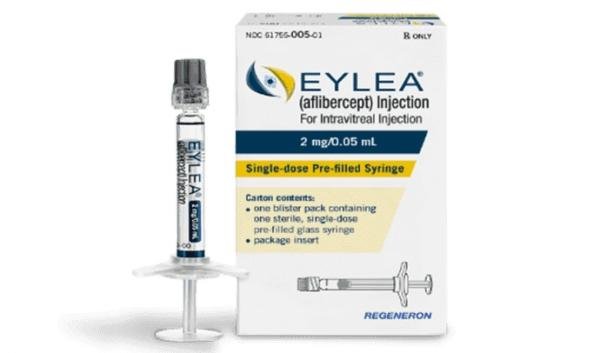Please note: a valid prescription is required for all prescription medication.
Uses of Eylea
Eylea is a medicine used to treat adults with:
- the ‘wet’ form of age-related macular degeneration (AMD), a disease which affects the central part of the retina (called the macula) at the back of the eye. The wet form of AMD is caused by choroidal neovascularisation (the abnormal growth of blood vessels under the macula), which may leak fluid and blood and cause swelling;
- impaired vision due to macular oedema (swelling) that follows blockage of either the main vein carrying blood from the retina (known as central retinal vein occlusion, CRVO) or of smaller branch veins (known as branch retinal vein occlusion, BRVO);
- impaired vision due to macular oedema caused by diabetes;
- impaired vision due to myopic choroidal neovascularisation (a severe type of short-sightedness where the eyeball continues to grow, becoming longer than it should be).
Eylea is also used to treat preterm infants with retinopathy of prematurity (ROP), an eye condition that can occur when a baby is born too early and blood vessels in the eye do not develop normally, causing damage to the retina. Eylea is used for specific stages of the disease: zone I (stage 1+, 2+, 3 or 3+) and zone II (stage 2+ or 3+) as well as the rapidly progressing severe form of the disease called aggressive posterior retinopathy disease.
Precautions and Warnings
You should not use Eylea if you are allergic to aflibercept, Eylea, Yesafili, Opuviz, or any of the inactive ingredients in these preparations. Get emergency medical help if you have any signs of an allergic reaction to Yesafili such as hives, difficulty breathing, or swelling of your eyes, face, lips, tongue, or throat.
There is a possibility that endophthalmitis (a serious inflammation of the intraocular fluids, usually due to infection) and retinal detachments may occur following intravitreal injections. Call your doctor at once if you have eye pain or redness, swelling or puffiness around your eyes, sensitivity to light, or sudden vision problems at any time during treatment. Arterial thromboembolic events are also possible following intravitreal VEGF inhibitor injections.
Increases in intraocular pressure have been seen within 60 minutes of an intravitreal injection.
Infants with ROP may need extended periods of monitoring after injections with Eylea.
Temporary visual disturbances may occur following an intravitreal injection with Eylea or Eylea HD, or the associated eye examinations. Do not drive or operate machinery until your vision recovers.
Tell your doctor if you are pregnant or plan to become pregnant while using Eylea or Eylea HD. You may need to undertake a pregnancy test if you are a female with childbearing potential. Use effective birth control to prevent pregnancy before your first dose of this medicine. Keep using birth control during treatment and for at least 3 months after your last Eylea injection.
Do not breastfeed while you are using Eylea.
Dosage
The usual recommended dose in adults is 2mg (0.05mL) (one injection) into each affected eye.
- An Eylea injection is usually administered every 4 weeks (approximately every 28 days, monthly) initially, which may be extended to once every 8 weeks (2 months), depending on the condition.
- In some patients, treatment may be extended to one dose every 12 weeks, although this is not as effective as the recommended every 8-week dosing.
- Follow your doctor’s dosing instructions very carefully.
Side Effects
Common side effects:
- eye redness
- feeling like something is in your eye
- dry or itchy eyes
- eye discomfort
- temporarily blurry vision
- floaters
Express Shipping - from $25.00
Shipping with this method takes 3-5 days
Prices:
- Dry-Packed Products $25.00
- Cold-Packed Products $35.00
Standard Shipping - $15.00
Shipping with this method takes 5-10 days
Prices:
- Dry-Packed Products $15.00
- Not available for Cold-Packed products
Rewards Program
Earn points on birthdays, product orders, reviews, friend referrals, and more! Enjoy your medication at unparalleled discounts while reaping rewards for every step you take with us.
You can read more about rewards here.
POINT VALUE
How to earn points
- 1Create an account and start earning.
- 2Earn points every time you shop or perform certain actions.
- 3Redeem points for exclusive discounts.
You Might Also Like
Related Articles
Zepbound Weight Loss: Curb Hunger and Lose Weight Fast
When tackling excess weight, many of us have felt the frustration of relentless hunger and sluggish progress. That’s where Zepbound weight loss steps in. This medication supports reduced appetite and…
Zepbound Dosage Guide: What You Need to Know
Zepbound follows a gradual step-up schedule to help your body adjust and minimize side effects. Whether you’re just starting or increasing your dose, understanding how the process works is key…
Easy 7‑Day Diet Plan for Weight Loss at Home
Looking for an easy way to kickstart your health goals? This 7-day diet plan for weight loss focuses on simple meals, balanced portions, and practical tips to help you build…
Retatrutide Starting Dose: Safe Way to Begin Treatment
Retatrutide is making headlines as a powerful new approach to weight loss. Although it’s still in the experimental stage, early clinical trials show it may help people lose a significant…



